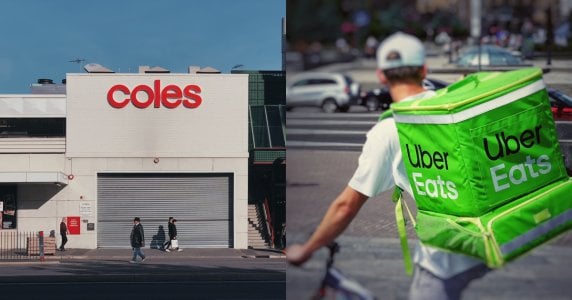Heads up: Your next Coles bill could be 10 per cent higher after this month
By
Seia Ibanez
- Replies 6
The convenience of having your groceries delivered right to your doorstep is undeniably appealing, especially in the current climate.
However, Coles shoppers who use delivery platforms like Uber Eats and DoorDash are now finding themselves paying a premium for this service.
A recent pricing change has seen the cost of grocery items on these platforms increase, no longer matching the in-store prices. This has led to a surge in grocery bills, with some customers reporting an increase of up to 10 per cent.
An Uber Eats driver first brought this issue to light, revealing that the platform had stopped price-matching grocery items with in-store prices.

‘They even tell drivers not to put receipts in the bag also so you guys don't complain about the price difference when delivered…heads-up,’ the driver said.
Uber Eats confirmed the pricing change in a message sent to its drivers.
‘On your Pack & Deliver trips, you may notice the price of requested items can differ between your list in the Uber Driver app and the store aisle—this is OK,’ the Uber Eats message said.
‘Please continue as usual to find and identify the correct item by using aisle numbers, product images and item barcodes.’
An Uber Eats spokesperson explained that merchants have the freedom to choose the items they want to sell and set their own prices.
‘We work closely with our merchants to ensure they bring a competitive selection of items to the Uber Eats app. Customers pay what they see on the Uber Eats app and are always asked to confirm before they proceed with their payment at check-out,’ the spokesperson said.
‘Should a customer feel that the fee charged is incorrect, Uber Eats has a 24/7 team that can attend to these queries and make adjustments where appropriate.’
It follows after Uber Eats announced that they are introducing a minimum spend for customers looking to purchase groceries online.
The online grocery platform said that those who want to purchase less than $10 worth of groceries will be hit with a $2.99 charge. You can read more about this announcement here.
However, this explanation has done little to appease disgruntled Coles shoppers. Many have expressed their disappointment, stating that the convenience of using delivery platforms no longer justifies the higher cost.
‘Yup, I noticed that the prices I pay for ordered groceries from Coles went up 10 per cent a couple of weeks ago,’ one shopper said.
‘You can compare prices by looking at the online store’s prices vs Uber’s prices.’
‘Compared to my last order, Coles stuff seems about 10 per cent higher priced, no mention of it at all either,’ another said.
A third added, ‘I actually used to get stuff for the same or slightly less than going to Coles and getting it myself when they had promotions on Doordash that [were].’
‘Now, it's at least 20 per cent more expensive and absolutely not worth it anymore.’
Coles and Woolworths offer their own grocery delivery services, but these often come with longer delivery times and minimum spending. This has created a gap in the market for platforms like Uber Eats, DoorDash, and Milkrun to offer quick, last-minute deliveries.
Earlier this month, Coles confirmed it would no longer offer the same in-store special prices and discounts when customers shopped via Uber Eats and DoorDash.
‘We have made a decision to adjust the price of products available through on-demand delivery platforms Uber Eats and DoorDash,’ a Coles spokesperson said.
‘This change reflects the convenience these services offer, allowing our customers in predominantly metro areas to order last-minute groceries and have them delivered in a short time frame.’
It is understood that this move is a common practice between retailers and businesses who use delivery platforms.
 Have you noticed this price increase while shopping recently? Share your experiences in the comments below.
Have you noticed this price increase while shopping recently? Share your experiences in the comments below.
However, Coles shoppers who use delivery platforms like Uber Eats and DoorDash are now finding themselves paying a premium for this service.
A recent pricing change has seen the cost of grocery items on these platforms increase, no longer matching the in-store prices. This has led to a surge in grocery bills, with some customers reporting an increase of up to 10 per cent.
An Uber Eats driver first brought this issue to light, revealing that the platform had stopped price-matching grocery items with in-store prices.

Shoppers complained about higher grocery bills when shopping on online grocery platforms like Uber Eats. Credit: Unsplash
‘They even tell drivers not to put receipts in the bag also so you guys don't complain about the price difference when delivered…heads-up,’ the driver said.
Uber Eats confirmed the pricing change in a message sent to its drivers.
‘On your Pack & Deliver trips, you may notice the price of requested items can differ between your list in the Uber Driver app and the store aisle—this is OK,’ the Uber Eats message said.
‘Please continue as usual to find and identify the correct item by using aisle numbers, product images and item barcodes.’
An Uber Eats spokesperson explained that merchants have the freedom to choose the items they want to sell and set their own prices.
‘We work closely with our merchants to ensure they bring a competitive selection of items to the Uber Eats app. Customers pay what they see on the Uber Eats app and are always asked to confirm before they proceed with their payment at check-out,’ the spokesperson said.
‘Should a customer feel that the fee charged is incorrect, Uber Eats has a 24/7 team that can attend to these queries and make adjustments where appropriate.’
It follows after Uber Eats announced that they are introducing a minimum spend for customers looking to purchase groceries online.
The online grocery platform said that those who want to purchase less than $10 worth of groceries will be hit with a $2.99 charge. You can read more about this announcement here.
However, this explanation has done little to appease disgruntled Coles shoppers. Many have expressed their disappointment, stating that the convenience of using delivery platforms no longer justifies the higher cost.
‘Yup, I noticed that the prices I pay for ordered groceries from Coles went up 10 per cent a couple of weeks ago,’ one shopper said.
‘You can compare prices by looking at the online store’s prices vs Uber’s prices.’
‘Compared to my last order, Coles stuff seems about 10 per cent higher priced, no mention of it at all either,’ another said.
A third added, ‘I actually used to get stuff for the same or slightly less than going to Coles and getting it myself when they had promotions on Doordash that [were].’
‘Now, it's at least 20 per cent more expensive and absolutely not worth it anymore.’
Coles and Woolworths offer their own grocery delivery services, but these often come with longer delivery times and minimum spending. This has created a gap in the market for platforms like Uber Eats, DoorDash, and Milkrun to offer quick, last-minute deliveries.
Earlier this month, Coles confirmed it would no longer offer the same in-store special prices and discounts when customers shopped via Uber Eats and DoorDash.
‘We have made a decision to adjust the price of products available through on-demand delivery platforms Uber Eats and DoorDash,’ a Coles spokesperson said.
‘This change reflects the convenience these services offer, allowing our customers in predominantly metro areas to order last-minute groceries and have them delivered in a short time frame.’
It is understood that this move is a common practice between retailers and businesses who use delivery platforms.
Key Takeaways
- Coles shoppers have noticed an increase of around 10 per cent in grocery bills when purchasing through delivery platforms such as Uber Eats and DoorDash.
- An Uber Eats driver revealed that the platform no longer price matches in-store grocery items and suggests drivers avoid including receipts to prevent customer complaints about price discrepancies.
- Uber Eats has stated that merchants set their prices on the app, and customers are made aware of the total cost before proceeding to payment, adding that the support team can make adjustments if needed.
- Coles confirmed they had adjusted their pricing on on-demand delivery platforms to reflect the convenience they offer, a move that aligns with common practice across businesses utilising such services.








